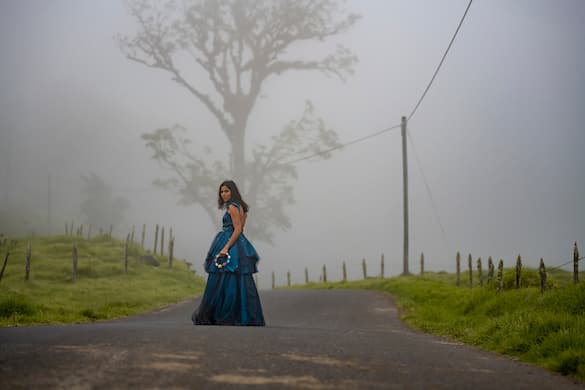Director Nathalie Álvarez Mesén Bursts Onto the Scene With ‘Clara Sola’
This is a picture whose originality of vision is inseparable from its cinematic surety. For comparison, think of the stories of Gabriel García Márquez, perhaps, or the paintings of Henri Rousseau.

The star of “Clara Sola,” a new film from director Nathalie Álvarez Mesén, has a face made for cinema. Given that Wendy Chinchilla Araya’s stock-in-trade is dance, this comment may count as something of a slight. While it’s true that the entirety of her body proves integral to her performance in the title role, it is the angular, rough-cut contours of Ms. Araya’s face that hold our attention. Certainly, Ms. Mesén’s camera makes the most of Ms. Araya’s features, gleaning from them a stark measure of grit and ferocity.
Ms. Araya is new to acting, and while Ms. Mesén has made a handful of short films, “Clara Sola” is her first feature. These points are worth iterating in that “Clara Sola” is a remarkable achievement, a picture whose originality of vision is inseparable from its cinematic surety. What can it be likened to? The stories of Gabriel García Márquez, perhaps, or the paintings of Henri Rousseau. Stephen King, too, though Ms. Mesén’s tale of sexual awakening and supernatural portent is a far cry from the pulp histrionics of “Carrie.”
Who is Clara, or, rather, what is it that sets her apart? We first see this 40-something woman communing with Yuca, an astonishingly beautiful white horse. Yuca is a source of income for Clara’s family, being regularly rented out to a local businessman who has a modest trade in providing tours of the Costa Rican rainforest. Clara lives with her mother, the dominating and judgmental Fresia (Flor María Vargas Chaves), and Maria (Ana Julia Porras Espinoza), the teenage daughter of her late sister.
Fresia is a pious woman — her house is dominated by looming icons — but she’s also savvy when it comes to profit-taking. Clara, you see, had an encounter with the Virgin some years back, and has gained the reputation as a conduit to God. Her peculiar demeanor, a brooding admixture of developmental backwardness and social unease, adds to the village lore about Clara’s gift. From time to time, Fresia opens her home to the luckless, the poor and the sick so they can partake of her daughter’s powers. At a price, of course. Yuca isn’t the only family member exploited for financial gain.
All of which is played against the backdrop of María’s upcoming quinceañera, and the arrival of Santiago (Daniel Castañeda Rincón), a sloe-eyed worker who has taken on a variety of chores at the homestead. Santiago begins a halting romance with María even as he establishes an on-again, off-again bond with Clara. Santiago is no lady-killer. He is, on the whole, kind and understanding, though Santiago’s skill at navigating the politics of Fresia’s cloistered environs evinces a distinct lack of common sense.
The screenplay by Ms. Mesén and Maria Camila Arias skirts around the truth and tangibility of Clara’s mystical abilities. In one scene, Clara exhales on an insect, seemingly bringing it back to life; in another, she evinces an ability to control plant life. When a minor earthquake hits the region, we’re left to wonder if it hasn’t been caused by a bout of emotional turbulence Clara is undergoing. And where do her persistent and, it would appear, late-blooming erotic longings fit into all of this? As storytellers, Ms. Mesén and Ms. Arias underline the enigmatic nature of Clara’s persona without explaining it. They let the mystery be.
Cinematographer Sophie Winqvist Loggins brings a documentarian’s eye to the lush Costa Rican landscape, all the while maintaining an almost pre-Raphaelite fixation on the inherent magic of its flora and fauna. This is particularly the case when Ms. Loggins parks her lens up-close to Ms. Araya as she handles a variety of colorful insects, lovingly caresses Yuco, or, for that matter, rolls around in the mud.
As a portrayal of one woman’s journey to selfhood, “Clara Sola” is sometimes unnerving, often puzzling, and ultimately transporting. It’s a debut that comes off like a masterstroke.

